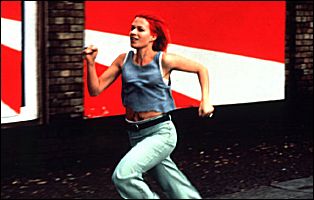![[Deep Focus]](../../flicker/logo.gif) |
|
|
RUN LOLA RUN | |
 |
GRADE: B+ | Run like hell. |
As intoxicated by (and, occasionally, hamstrung by) the myriad possibilities of cinema as anything from Peter Greenaway, though altogether different in both aspiration and effect, 33-year-old writer/director Tom Tykwer's Run Lola Run (Lola rennt) is a blast right in the face of everything else on the scene. Redhead Lola (Franka Potente) gets a first-reel phone call from hysterical boyfriend Manni (a wiry Moritz Bleibtreu), who left a bag containing 100,000 marks in drug money on a subway train. His boss will, he's certain, kill him for botching the job. At high noon, Manni decides, he'll hold up a grocery to get the money before his boss is scheduled to meet him. To save him, Lola has just 20 minutes to get the money and rendezvous with Manni. Since her moped has been stolen, she'll have to run like hell just to get there. That's the threadbare story. Tykwer layers it with gimmick upon gimmick, composing the film with the sensibilities of a music video. That's not a complaint -- freed of most narrative concerns, the best music videos have offered some of the more sublime visual images in recent memory. And if Run Lola Run is set to an incessant techno beat, it's significant that the music is specific to this film, with vocal performances by both the director and his star. It's also important that the soundtrack actually works as film music -- it's the best kind of propulsive Eurotechno, with a rich, multilayered soundscape that evolves through the film's 81-minute running time. The key image is that of Lola running. Over and over, Lola dashes across the screen, or sprints alongside the camera, which travels at equal speed. The cumulative effect is exhilarating, allowing viewers to read their own sense of passion and purpose into Lola's headlong velocity. Hard-edged and streamlined in a tank top and green checkered pants, Lola's a fashionably athletic icon for an international cinema that's lately been fascinated by this brand of frantic kineticism. Superficially similar to Danny Boyle's Trainspotting and Doug Liman's Go, Run Lola Run reduces eclecticism to pure impulse. At 81 minutes, Run Lola Run has no time for conventional narrative. It's never, ever boring. And, importantly, it knows exactly when to quit. There are breaks in the action, such as a couple of gorgeous interludes showing Lola and Manni in bed together, bathed in red, that function as character development. Events that don't directly involve those two are shot on video, underscoring one of the film's concerns, which is the ways that lives are affected forever as Lola bursts across the frame. (Without giving too much away, I think the selective presence of a video image underlines the changeability of reality, suggesting that these scenes are more of a fiction than the "trueness" of the film image, which is equated solely with Lola's quest to save her beloved.) Depending on the timing of her arrival on the scene, destinies are altered. The film makes much out of this kind of coincidence, to often witty effect. Animated clips of a cartoon Lola and series of still frames are also thrown into the mix. While this all makes for a rockin' good time at the movies, and maybe even speaks to us in a primal way about love, desperation, and the refusal of destiny, it's still a slight accomplishment. If (and this is a big if) Tykwer figures out how to integrate this kind of frenetic invention into a more involving narrative with full-blooded characters, he may go and make a great film. As is, Run Lola Run is more like a knockout demo reel. | |
|
Written and directed by Tom Tykwer Cinematography by Frank Griebe Starring Franka Potente
German with English Subtitles Germany, 1998 | |

| |
 http://www.deep-focus.com/index.html
bryant@deep-focus.com
http://www.deep-focus.com/index.html
bryant@deep-focus.com